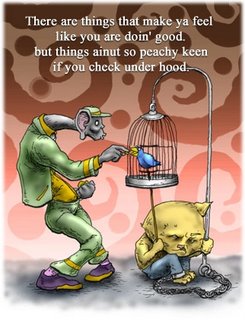Remembering Ralph....
I just ate my late dinner last night upon arriving from work & we’re (my mom & I) off to Ralph’s wake.
My four year-old inaanak who died of dengue just a week ago.
It’s just so sad that he have to die this way.
He’s an active, hyper, cutie, super-stouty kid.
Who surprisingly don’t visit me two Christmasses ago to claim his gift - and now it turned three.
To understand more of it, here is MedLine Plus basic facts on Dengue Fever.
OVERVIEW
Dengue fever is an infectious disease carried by mosquitoes and caused by any of four related dengue viruses.
This disease used to be called "break-bone" fever because it sometimes causes severe joint and muscle pain that feels like bones are breaking, hence the name.
Health experts have known about dengue fever for more than 200 years.
CAUSE
Dengue fever can be caused by any one of four types of dengue virus: DEN-1, DEN-2, DEN-3, and DEN-4.
You can be infected by at least two, if not all four types at different times during your lifetime, but only once by the same type.
TRANSMISSION
You can get dengue virus infections from the bite of an infected Aedes mosquito.
Mosquitoes become infected when they bite infected humans, and later transmit infection to other people they bite.
Two main species of mosquito, Aedes aegypti and Aedes albopictus, have been responsible for all cases of dengue transmitted in this country.
Dengue is not contagious from person to person.
SYMPTOMS
Symptoms of typical uncomplicated (classic) dengue usually start with fever within 5 to 6 days after you have been bitten by an infected mosquito and include:
High fever, up to 105 degrees Fahrenheit
Severe headache
Retro-orbital (behind the eye) pain
Severe joint and muscle pain
Nausea and vomiting
Rash
The rash may appear over most of your body 3 to 4 days after the fever begins.
You may get a second rash later in the disease.
Symptoms of dengue hemorrhagic fever include all of the symptoms of classic dengue plus marked damage to blood and lymph vessels.
Bleeding from the nose, gums, or under the skin, causing purplish bruises
This form of dengue disease can cause death.
Symptoms of dengue shock syndrome-the most severe form of dengue disease-include all of the symptoms of classic dengue and dengue hemorrhagic fever, plus fluids leaking outside of blood vessels.
Massive bleeding.
Shock (very low blood pressure).
This form of the disease usually occurs in children (sometimes adults) experiencing their second dengue infection.
It is sometimes fatal, especially in children and young adults.
DIAGNOSIS
Your health care provider can diagnose dengue fever by doing two blood tests, 2 to 3 weeks apart.
The tests can show whether a sample of your blood contains antibodies to the virus.
In epidemics, a health care provider often can diagnose dengue by typical signs and symptoms.
TREATMENT
There is no specific treatment for classic dengue fever, and like most people you will recover completely within 2 weeks.
To help with recovery, health care experts recommend
Getting plenty of bed rest
Drinking lots of fluids
Taking medicine to reduce fever
CDC advises people with dengue fever not to take aspirin, acetaminophen or other over-the-counter pain-reducing medicines are safe for most people.
For severe dengue symptoms, including shock and coma, early and aggressive emergency treatment with fluid and electrolyte replacement can be lifesaving.
PREVENTION
The best way to prevent dengue fever is to take special precautions to avoid contact with mosquitoes.
Several dengue vaccines are being developed, but none is likely to be licensed by the Food and Drug Administration in the next few years.
When outdoors in an area where dengue fever has been found
Use a mosquito repellant containing DEET, picaridin, or oil of lemon eucalyptus
Dress in protective clothing-long-sleeved shirts, long pants, socks, and shoes
Because Aedes mosquitoes usually bite during the day, be sure to use precautions especially during early morning hours before daybreak and in the late afternoon before dark.
Other precautions include:
Keeping unscreened windows and doors closed
Keeping window and door screens repaired
Getting rid of areas where mosquitoes breed, such as standing water in flower pots, containers, birdbaths, discarded tires, etc.
COMPLICATIONS
Most people who develop dengue fever recover completely within 2 weeks.
Some, however, may go through several weeks to months of feeling tired and/or depressed.
Marilou’s (Ralph’s mom) mundane activities of life instantly changed – even dramatically, upon the death of her son.
The world she once knew is now totally different.
There is now an emptiness that can never be completely filled.
And I totally understand her grief.
And eventhough she might return on the motions of living, I know acceptance of her child’s death will only come after many tears and many painful experiences.
The death of a child might never make any sense, but the ability to move beyond the death into a more hopeful living where joy returns is possible once the child’s death has become a reality.



















